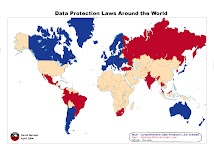
Powerchex have scooped the Business of the Year award at the Docklands Business Club and East London Chamber of Commerce Business Awards. The awards and gala dinner were sponsored by Barclays and were held at the prestigious Formans Fish Island, overseeing the 2012 Olympics site. Powerchex’s success follows on from last year when they were awarded Business of the Year at the Thames Gateway Business Awards.
Powerchex were shortlisted for the much converted Business of the Year award alongside other businesses who had managed to sustain growth and profitability despite the tough economic conditions. The company have followed up on impressive financial results in 2007 and 2008 by continuing to be profitable in 2009 despite the recession. They have also acquired over 50 new clients since the turn of the year and boast an impressive office in London close to many of the financial institutions they service.
Powerchex specialise in employee screening and check the background, employment history, criminal records and professional qualifications of applicants on behalf of financial institutions and set the industry benchmark of 5 days for a background check. Alexandra Kelly, Managing Director of Powerchex, first took her idea to the Dragons Den on the BBC but was told that pre-employment screening could not be delivered in 5 days. Undeterred, Alexandra went it alone and started the business in 2005 with 1 employee, one desk and 2 computers.
Within months Alexandra convinced one of the largest insurers in the world to give Powerchex a chance and four years later they are just 1 of 310 financial institutions who entrust Powerchex with their employee screening.
Richard Keenan, Local Business Manager for Barclays, said, “Despite the economic downturn, Powerchex demonstrated their ability to grow the business substantially, concentrating on beating the competition hands down whilst developing their staff in a highly effective manner. Alexandra is the driving force behind the business and the team and Alexandra herself have built a solid foundation. I wish them all the best in the future.”
Powerchex reputation preceded them when they entered the Business of the Year category in this year's DBC/ELCC Business Awards sponsored by O2. Sweeping the opposition aside Alexandra Kelly stepped up to the podium to hear DBC Chairman Rita Beckwith tell her audience "Alexandra's vision, perseverance and entrepreneurial skills took Powerchex from a failed Dragon's Den competitor to become a highly respected, successful company. The motivation and management skills of her team deliver outstanding service and innovation to their clients."
Powerchex were shortlisted for the much converted Business of the Year award alongside other businesses who had managed to sustain growth and profitability despite the tough economic conditions. The company have followed up on impressive financial results in 2007 and 2008 by continuing to be profitable in 2009 despite the recession. They have also acquired over 50 new clients since the turn of the year and boast an impressive office in London close to many of the financial institutions they service.
Powerchex specialise in employee screening and check the background, employment history, criminal records and professional qualifications of applicants on behalf of financial institutions and set the industry benchmark of 5 days for a background check. Alexandra Kelly, Managing Director of Powerchex, first took her idea to the Dragons Den on the BBC but was told that pre-employment screening could not be delivered in 5 days. Undeterred, Alexandra went it alone and started the business in 2005 with 1 employee, one desk and 2 computers.
Within months Alexandra convinced one of the largest insurers in the world to give Powerchex a chance and four years later they are just 1 of 310 financial institutions who entrust Powerchex with their employee screening.
Richard Keenan, Local Business Manager for Barclays, said, “Despite the economic downturn, Powerchex demonstrated their ability to grow the business substantially, concentrating on beating the competition hands down whilst developing their staff in a highly effective manner. Alexandra is the driving force behind the business and the team and Alexandra herself have built a solid foundation. I wish them all the best in the future.”
Powerchex reputation preceded them when they entered the Business of the Year category in this year's DBC/ELCC Business Awards sponsored by O2. Sweeping the opposition aside Alexandra Kelly stepped up to the podium to hear DBC Chairman Rita Beckwith tell her audience "Alexandra's vision, perseverance and entrepreneurial skills took Powerchex from a failed Dragon's Den competitor to become a highly respected, successful company. The motivation and management skills of her team deliver outstanding service and innovation to their clients."




